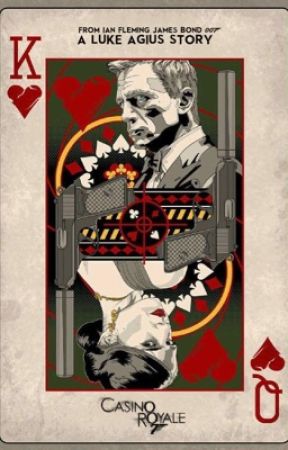It was twelve o'clock when Bond left the Splendide, and the clock on the mairie was stumbling through its midday carillon. There was a strong scent of pine and mimosa in the air, and the freshly watered gardens of
the Casino opposite, interspersed with neat gravel parterres and paths, lent the scene a pretty formalism more
appropriate to ballet than to melodrama.
The sun shone, and there was a gaiety and sparkle in the air which seemed to promise well for the new era of
fashion and prosperity for which the little seaside town, after many vicissitudes, was making its gallant bid.
Royale-les-Eaux, which lies near the mouth of the Somme before the flat coast-line soars up from the beaches of southern Picardy to the Brittany cliffs which run on to Le Havre, had experienced much the same fortunes as Trouville.
Royale (without the Eaux) also started as a small fishing-village, and its rise to fame as a fashionable watering-place during the Second Empire was asmeteoric as that of Trouville. But as Deauville killed Trouville, so, after a long period of decline,; did LeTouquet kill Royale.
At the turn of the century, when things were going badly for the little seaside town and when the fashion
was to combine pleasure with a 'cure,' a natural spring in the hills behind Royale was discovered to contain
enough diluted sulphur to have a beneficent effect on the liver. Since all French people suffer from liver complaints, Royale quickly became Royale-les-Eaux, and Eau Royale, in a torpedo-shaped bottle, grafted itself
demurely on to the tail of the mineral-water lists in hotels and restaurant cars.
It did not long withstand the powerful combines of Vichy and Perrier and Vittel. There came a series of lawsuits; a number "of people lost a lot of money, and very soon its sale was again entirely local. Royale fell
back on the takings from French and English families during the summer, on its fishing-fleet in winter and on
the crumbs which fell to its elegantly dilapidated Casino from the tables at Le Touquet.
But there was something splendid about the Negresco baroque of the Casino Royale, a strong whiff of Vic-
torian elegance and luxury, and in 1950 Royale caught, the fancy of a syndicate in Paris which disposed of large funds belonging to a group of expatriate Vichyites.
Brighton had been revived since the war, and Nice. Nostalgia for more specious, golden times might be a
source of revenue.
The Casino was repainted in its original white and gilt, and the rooms decorated in the palest grey with
wine-red carpets and curtains. Vast chandeliers were suspended from the ceilings. The gardens were spruced,
and the fountains played again, and the two main hotels, the Splendide and the Hermitage, were prinked
and furbished and restaffed.
Even the small town and the vieux-port managed to fix welcoming smiles across their ravaged faces, and the
main street became gay with the 'vitrines' of great Paris jewellers and couturiers, tempted down for a butterfly season by rent-free sites and lavish promises.
Then the Mahomet Ali Syndicate was cajoled into starting a high game in the Casino and the Socie"te des
Bains de Mer de Royale felt that now at last Le Touquet would have to yield up some of the treasure stolen over
the years from its parent plage.
Against the background of this luminous and sparkling stage Bond stood in the sunshine and felt his
mission to be incongruous and remote and his dark profession an affront to his fellow actors.
He shrugged away the momentary feeling of unease and walked round the back of his hotel and down the
ramp to the garage. Before his rendezvous at the Hermitage he decided to take his car down the coast road and have a quick look at Le Chiffre's villa and then drive back by the inland road until it crossed the route nationale to Paris.

YOU ARE READING
James Bond: Casino Royale
FanficBOND FELT SOMETHING HARD PRESS INTO HIS SPINE... At the same time a thick voice said softly, urgently, just behind his right ear: "This is a gun, Monsieur". It is silent. It can blow the base of your spine off without a sound. Withdraw your bet b...
